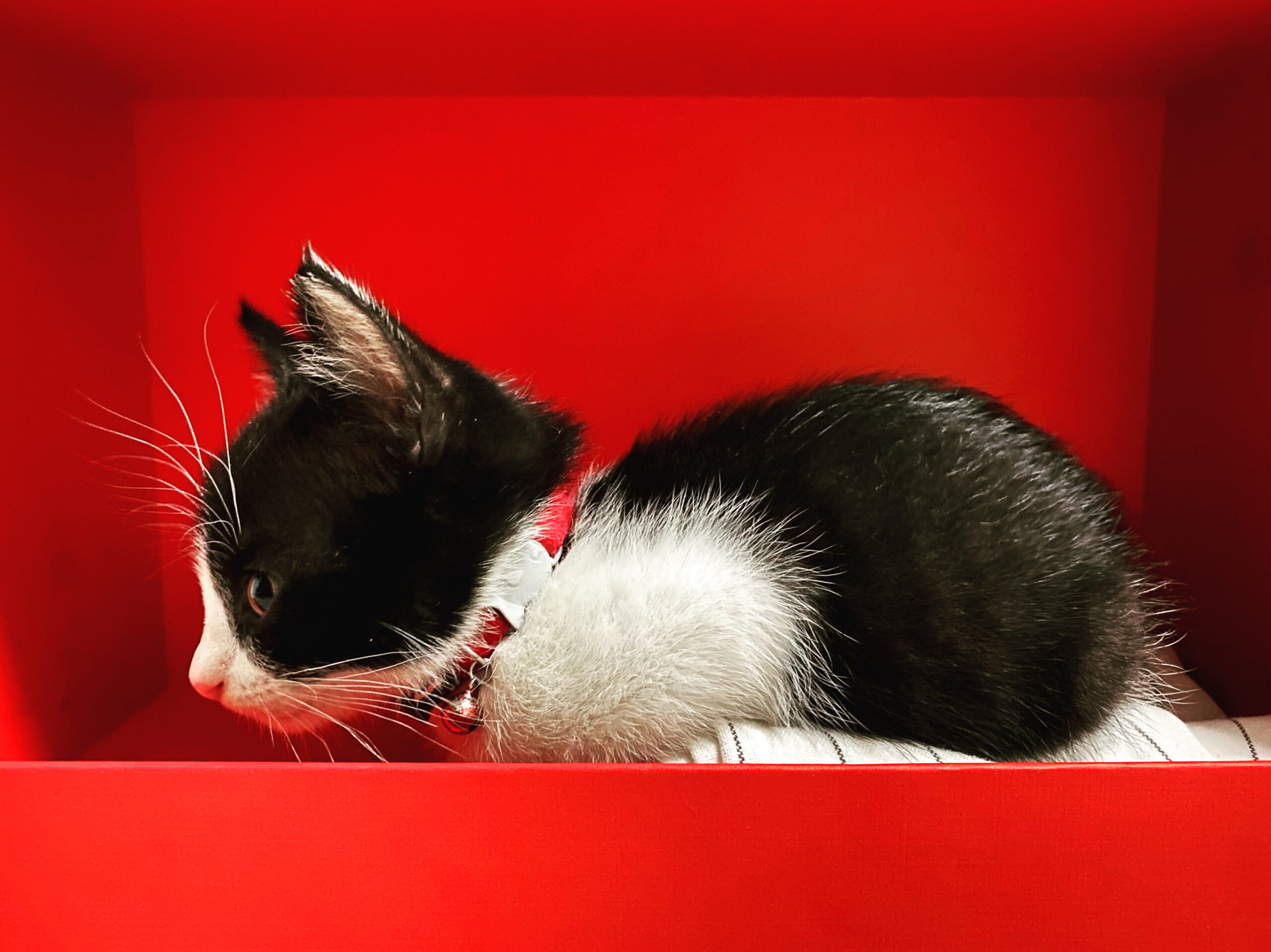Known as curious and playful creatures, your new kitten will undoubtedly be an exciting addition into your home! While kittens may appear to be low maintenance compared to other pets, cats require a lot of care and love. Here are some of the basics to think about when taking care of your newborn kitten.
Keep your home cat-proofed
Kittens love to hide in the most unlikely of places, and can get their paws on anything lying around the house. For example, nifty items such as loose buttons, rubber bands, floss (and even your own medication) can be dangerous if swallowed by accident. If you have green fingers, make sure that the plants you have around the house aren’t poisonous to your kitten. Get some edible cat grass just in case you find that they are attracted to the greenery. Your kitten can also fiddle or leap at hanging blind cords or electrical cords, so be sure to tuck them away neatly. Cats also tend to like to sit in high places, to avoid high-rise syndrome – remember to keep windows and balcony doors tightly secured to refrain from painful falls.
Visit your vet and vaccinate early
One key part of taking care of a kitten is bringing them to the vet early. Your kitten should be vaccinated as early as 8, and your local vet can advise which vaccinations to take to prevent fatal feline diseases, such as the cat flu. Regular check-ups can also keep parasite control in check to make sure your cat isn’t infected from fleas or worms.
Invest in a comfortable carrier
To ease visits to the vet, picking the right carrier is important so that your cat doesn’t feel threatened from leaving the house. Choose a carrier large enough so that your kitten can comfortably turn around within it. Put in a blanket that it may have used at home with their scent so your kitten feels settled.
Allow them to sense their environment to give them their own space
There are three main areas you’ll want to mark in your home – where they eat, sleep and do their business. For their beds, make sure that they are scent soakers so that they can leave their scents on it so that they can claim their own territory in a positive way.
Cats need potty training too
Consider getting more than one litter box and setting up in different areas of the house. Ensure you clean it with a litter scoop at least once a day for regular hygiene – it means you can notice changes in your cat’s stool too. If you spot a change in behaviour such as your cat peeing outside its litter box, it can be a sign of its dirty state or even urinary tract infection – seek advice from a vet as soon as you can.
With a selection from pine pellets, naturally unscented to clay litter – it’s safer to go for something fragrance free so that your kitten doesn’t object to its smell or texture. You’ll also find that clumping litter is an option which makes it easier for you to clean up when your cat urinates – but make sure you don’t opt for this option until your kitten is at least a year old because it would be dangerous if they ate it!
Don’t move the litter boxes once you’ve decided on an area, and place your kitten in them once they are done with their meals. Reward them with treats when you notice them using it appropriately.
Decide on a feeding schedule
Some owners like providing meals at set times in the day, while others prefer free feeding. Free feeding means you can leave food out once a day and your cat can nibble whenever they please (only dry, as wet food can’t be left throughout the day) – but be wary about the weight of the food. Adapt or mix both methods until you find what works best for your cat. Consider a mixture of foods such including dry food to maintain good dental health.
Also remember to replenish your cat’s water supply so it’s fresh – some cats dislike bending down to drink, so consider a cat fountain as an alternative. If you do end up settling on a bowl though, use stainless steel dishes that are wide and shallow so that they are easy to clean and comfortable for your cat.
Grooming means brushing and trimming nails frequently
Brushing your cat with the right brush (around once or twice a week) can routinely remove dirt, dead hair, grease and stimulate blood circulation to improve their skin condition. It also prevents them from ingesting dead hairs while they’re self-grooming.
At these grooming sessions, also make it a habit to run your hands along the cat’s body to look for bumps, tangles and also the area under their tails too. If you can, inspect their ears too to see if they are red or have unusual discharge. For their nails – start playing with your kitten’s paws often by gently handling them so that your cat is accustomed to the feeling so it’s easier for you to trim their nails later on.
Diversify what your cats can scratch on
It goes without saying that cats love scratching! Explore a range of materials and items and train them to scratch them until they find something they like to prevent them from reaching your furniture. From sisal rope, carpet, bare wood to cardboard – regular scratching can help remove outer and older layers of their nails. Also think about the height too, it would be ideal to find something that has a study wide base and can accommodate their height at their tallest.
Stimulate your kitten with interactive games and toys
While cats have a rep for being introverts, it’s important for you to slot in play time for you to bond with them. Try various interactive puzzles and toys so they are mentally happy and physically healthy!
Some cat accessories to think about..
Cats love to play hide and seek. Consider getting a cat collar with a name tag or a bell so that they don’t go astray within the home or in the neighborhood. Ensure the collar fits properly and does not irritate your cat’s neck or affect its breathing or swallowing.
With careful care and considerations, you’reset for a happy and healthy companionship with your kitten at home with friends and family. Read more about taking care of your newborn kitten on other parts of our website.













